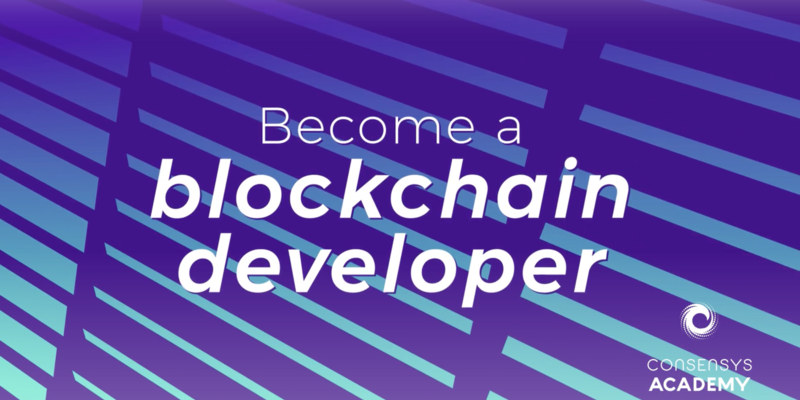
Blockchain Developer Course by Consensys
This end-to-end Ethereum developer course is a robust, self-paced course that has been created with the busy professional in mind.
This course provides motivated developers all the necessary content, tools, and tips in order to build their Ethereum knowledge and development skills at their pace as their schedule allows. The course will cover Ethereum concepts, introduce key developer tools, go over security best practices, and explain the other aspects of smart contract and dApp development.
Module 1: Review of Blockchain Technology
Welcome to Module 1: Review of Blockchain Technology
Module 1 Pre-Assessment (Not Graded)
Contextualizing Blockchain
1.1 Distributed Ledgers
1.2 Consensus Mechanisms
1.3 Mining in Ethereum
1.4 Public and Private Blockchains
1.5 Distributed Ledger Platforms
Module 1 Test
Module 1 Recap
Module 2: Blockchain Primitives
Welcome to Module 2: Blockchain Primitives
Module 2 Pre-Assessment (Not Graded)
2.1 Cryptographic Hash Functions
2.1.1 Playing with Cryptographic Hash Functions
2.2 Public Key Cryptography
2.3 Merkle Trees
2.3.1 Playing with Merkle Trees
2.4 Blockchain Structure
2.4.1 Building a Blockchain
2.5 Smart Contracts
2.5.1 Smart Contracts
2.6 Nodes
2.7 Blockchain Forks
Module 2 Test
Module 3: Ethereum Basics
Welcome to Module 3: Ethereum Basics
Module 3 Pre-Assessment (Not Graded)
3.1 Accounts
3.2 Transactions
3.3 Gas and Fees
3.4 Ethereum Structure
3.5 Externally Owned Accounts and Ethereum Transactions
3.6 Generating Ethereum Addresses
Module 3 Test
Module 3 Recap
Module 3 Feedback
Module 4: Traditional and Decentralized Application Development
Welcome to Module 4: Traditional and Decentralized Application Development
Module 4 Pre-Assessment
4.1 Decentralized Application Development
4.2 Similarities and Differences
4.3 Development Environment Setup Options
4.4 Key Developer Tools
4.5 Installing and Using Geth
4.6 Connecting to a testnet
4.7 Geth PoA Private Network Tutorial
Module 4 Test
Module 4 Recap
Module 5: Development Frameworks and Environment
Welcome to Module 5: Development Frameworks and Environment
Module 5 Pre-Assessment
Introducing Metamask
Interview with Dan Finlay from Metamask
5.1 Development Workflow: A Low Level Overview
5.2 Development Workflow: Ganache CLI
5.3 The Truffle Development Environment
5.4 Installing Truffle
5.5 The Structure of a Truffle Project
5.6 The Ethereum Package Manager (Optional / Informational)
Ganache GUI
Module 5 Recap
Module 5 Feedback
Module 6: Solidity Fundamentals
Welcome to Module 6: Solidity Fundamentals
Module 6 Pre-Assessment
6.1 Data Types and Variables
6.2 Functions
6.3 Storage and Memory
6.4 Contract Structure
6.5 Reading Smart Contracts with Remix
6.6 Smart Contract ABI
6.7 Events and Logs
6.8 Factory Contracts
Module 6 Test
Module 6 Recap
Module 7: Writing Smart Contracts
In Module 7
Module 7 Pre-Assessment
7.1 Introductory Smart Contracts
7.2 Inter-Contract Execution
7.3 Inheritance
7.4 Libraries and the Ethereum Package Manager
7.5 Smart Contract System Design
7.6 Writing a Smart Contract (Proof of Existence Exercise)
7.7 Deeper into Smart Contracts (Multi-Signature Wallet Exercise)
7.8 Debugging Truffle Tests
7.8.1 More On Writing Tests in Solidity
7.9 Practice Writing Smart Contracts
7.10 Check Your Work
Module 7 Test
Module 8: Ethereum and the End User
Module 8
Module 8 Pre-Assessment
8.1 Introduction to Web 3.0
8.1.1 Using the Web3.js JavaScript Library
8.1.2 Connecting Web3.js to a Contract
8.2 Building Truffle for the Web
8.2.1 Updates to Metamask
8.3 Integrating with React
8.3.1 Rimble UI
Module 8 Test
Module 8 Recap
Module 9: Smart Contracts Pitfalls, Testing and Debugging
In Module 9
Module 9 Pre-Assessment
9.1 Writing Tests
9.1.1 Catching Solidity Errors in Truffle Tests
9.2 Smart Contract Best Practices
9.3 Exploits and Dangers
9.4 Optimizing Gas
9.5 Safety Checklist
9.6 Security Analysis Tools
9.7 Attack Demos
9.7.1 Denial of Service Attack Example
9.7.2 Reentrancy Attack Example
9.7.3 Integer Over/Underflow Example
Module 9 Test
Module 9 Recap
Feedback up to Module 9
Module 10: Advanced Topics
Module 10
10.1 Smart Contract Design Patterns
10.2 The Ethereum Name Service
10.3 Introduction to IPFS
10.4 Upgradable Contracts
10.5 Oracles with Rhombus
10.5.1 Rhombus Network
10.5.2 Rhombus Network Tutorial
10.6 Formal Verification
10.7 What are Zero-Knowledge Proofs?
Module 10 Recap
Module 11: Additional Topics
Module 11
11.1 Introduction to Vyper
11.1.1 Writing Ethereum Smart Contracts in Vyper
11.2 Ethereum Improvement Proposals (EIPs)
Price
Price $295
Price does not include a certificate at the end of the course. Upon successful completion, you may make a request to ConsenSys Academy for a certificate which will be issued after a technical assessment for a fee.
Want to find a web3 job?
| Job Position and Company | Location | Tags | Posted | Apply |
|---|---|---|---|---|
| Latin America Latin America Latin America | Apply | |||
| | United States | Apply | ||
 | Remote | Apply | ||
 | by Metana | Info | ||
| | San Francisco, CA, United States | Apply | ||
| Los Angeles, CA, United States | Apply | |||
| | Remote | Apply | ||
| | New York, United States | Apply | ||
| Remote | Apply | |||
| | New York, United States | Apply | ||
| New York, United States | Apply |